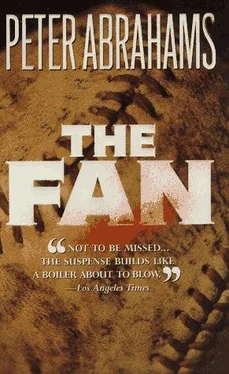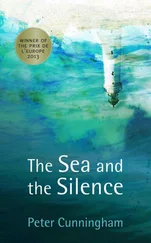Peter Abrahams - The Fan
Здесь есть возможность читать онлайн «Peter Abrahams - The Fan» весь текст электронной книги совершенно бесплатно (целиком полную версию без сокращений). В некоторых случаях можно слушать аудио, скачать через торрент в формате fb2 и присутствует краткое содержание. Жанр: Триллер, на английском языке. Описание произведения, (предисловие) а так же отзывы посетителей доступны на портале библиотеки ЛибКат.
- Название:The Fan
- Автор:
- Жанр:
- Год:неизвестен
- ISBN:нет данных
- Рейтинг книги:4 / 5. Голосов: 1
-
Избранное:Добавить в избранное
- Отзывы:
-
Ваша оценка:
- 80
- 1
- 2
- 3
- 4
- 5
The Fan: краткое содержание, описание и аннотация
Предлагаем к чтению аннотацию, описание, краткое содержание или предисловие (зависит от того, что написал сам автор книги «The Fan»). Если вы не нашли необходимую информацию о книге — напишите в комментариях, мы постараемся отыскать её.
The Fan — читать онлайн бесплатно полную книгу (весь текст) целиком
Ниже представлен текст книги, разбитый по страницам. Система сохранения места последней прочитанной страницы, позволяет с удобством читать онлайн бесплатно книгу «The Fan», без необходимости каждый раз заново искать на чём Вы остановились. Поставьте закладку, и сможете в любой момент перейти на страницу, на которой закончили чтение.
Интервал:
Закладка:
“That’s really nice of you, Gil,” Figgy said. He lowered his voice: “Don’t think I’ve forgotten that money.”
That’s what he’d picked to feel ashamed about. “Money?” said Gil.
Figgy lowered his voice some more. “That money I owe you.”
Gil laughed, a new laugh that went nicely with his new smile. “Forget it. What’s fifty bucks between amigos? Buy a little something for old Bridgid out there. Be a sport.”
Then he turned and walked out, past Garrity who was hovering over Bridgid, still crying at her desk, and down to the street. Out. Free.
He got into the 325i, started it, drove a few blocks before the scraping sound bothered him. He stopped in the middle of the street, walked around to the back of the car. There was a big dent behind the left-rear wheel, and the tailpipe was dragging. He bent down and tore it off. The muffler came with it. Then he overcame an impulse to tear the whole car apart right there, piece by piece; and drove to Cleats.
Gil ordered a draft with a shot of Jose Cuervo Gold on the side.
“Your son enjoy the game?” Leon said, setting the drinks on the bar.
Gil looked at him.
“Richie. That’s his name, isn’t it?”
“How did you know that?”
“You’ve mentioned it a few times,” said Leon, his voice rising a little in surprise.
Ease up, Gil said to himself. Leon was a pal, right? He smiled at Leon, hoping it was his old smile, not the new one, but unsure. “Yeah, he enjoyed it. What kid wouldn’t?”
“Opening Day,” said Leon. “Some game.”
“Yeah.”
“Maybe you were right about Rayburn.”
“I was?”
“Hard to argue with a poke like that.” Leon drew someone a pint.
The Globe sports section lay on the bar. Gil picked it up and started reading. He read about the grand slam, hunted up all the details of the game, studied the box score, then all the box scores; downed the beer and the shot, ordered another round. Feeling pretty good now, and, yes, even optimistic. Of course he’d been right about Rayburn. He knew the game, knew the team, knew the man. He checked his red-and-black tie in the mirror behind the bar. Nice.
Then he came to a sidebar on Bobby Rayburn-“Paying Early Dividends”-that included the breakdown of his contract. Gil went over them-$2.5 million signing bonus, $5.05 million the first year, $5.45 million the next, $5.85 million the year after that, $6.05 million in the option year, the separate $1 million deferred-payment fund. The reporter estimated Rayburn’s endorsement income at $750,000 a year. Well, why not? One swing of the bat. He was going to take them all the way, as Gil had foreseen. He tore out the article, folded it, and put it in his wallet.
A few minutes later he took it out to read again the part about the deferred payments. They began in 2007, $50,000 a year for as long as he lived. That was the part Gil liked best of all: Rayburn knew right now where his money was coming from in 2007. Gil didn’t know where his money was coming from next week. He examined his face in the mirror for signs of optimism. It was dark and swollen, as though gorged with blood.
He had one more round. His pants were almost dry.
“Guess who stopped in last night?” Leon said.
“Figgy.”
“Yeah, Figgy was here. With that girlfriend of his. Drinking champagne. But that’s not who I meant.”
“Who did you mean?”
“Ball players. They usually go to Bluebeard’s. Maybe they’re going to start coming here-I know they liked the buffalo wings. I brought them two helpings each.”
“What ball players?”
“Primo. Sanchez. Zamora. Couple of others.”
“Where’d they sit?”
Leon pointed to a table in the back alcove, under the autographed Louisville Sluggers of Aaron and Mays, crossed like a device on a medieval shield.
“What were they talking about?”
Leon shrugged. “They spoke Spanish.” He thought. “Is there some guy called Onsay in baseball?”
“Not that I’ve heard of.”
“They kept joking about him.”
“What do you mean?”
“Primo’d say Onsay, and the others would crack up.”
“Got the encyclopedia?”
Leon pulled the Baseball Encyclopedia from under the bar. There was no one between Manuel Dominguez “Curly” Onis, who’d gone to the plate once for the 1935 Brooklyn Dodgers and singled, and Edward Joseph Onslow, who’d hit. 232 in 207 at bats spread over four years between 1912 and 1927.
Gil returned to Curly Onis’s meager line. “What’s The Crying Game? ” he said.
“Some movie.”
“About baseball?”
“I don’t think so,” Leon replied. He ran his finger down the page. “Maybe Onsay’s a rookie.”
“I’d have heard of him,” Gil said. He had a hit of tequila, drained his beer, and was considering another round or two, just to sit at the bar, poring over the small print, when Leon said:
“Day off?”
“Naw.” That ruined it. Gil closed the book and asked for his bill.
“That’s okay,” Leon said.
“What’s okay?”
“This one’s on the house.”
Meaning that Leon knew what Figgy’d been celebrating.
Gil drove north, out of the city, into the mountains. At first the car smelled of the ammonia soap he’d scrubbed it with in the middle of the night; later, with the heat on, he detected pissy smells. Everything was brown, except for the artificial snow on the trails of the ski resorts. Gil listened to the ball game, heard them lose three-zip, with Rayburn going 0 for 4. Meant nothing. After, on the JOC, a caller wondered about Rayburn’s rib cage and Bernie said the story had been blown out of proportion, Rayburn was fine, and Burrows had handled it fine.
“Bullshit,” Gil said; and then, at the top of his lungs, all alone in the car, “Bullshit.” Burrows had jeopardized Rayburn’s career and the team’s entire season, and the media were covering it up. The rib cage was obviously killing Rayburn-why else would he have been short with him in front of the dugout? He called the JOC to blast Bernie, but couldn’t get through.
Gil left the interstate, followed secondary roads. From time to time he stopped for a drink, the last one in a crummy sports bar-nothing like Cleats-in a crummy town.
It was dark, and Gil hadn’t eaten. Sitting at the bar, he drank a beer and a shot while he looked at the menu. Then he ordered another beer and another shot.
“And something to eat?”
Gil shook his head.
Sometime later, he found that this bar too had a copy of the Baseball Encyclopedia. Gil, hunched alone in the far corner of the bar, lost himself in it.
Much later, he looked up Onsay again. Then Boucicaut. And Claymore. And himself. Renard, Gilbert Marcel. None of them were there. He left at closing time, walking out to a cold and silent street. Main Street, he saw, in his old hometown.
11
The night was black and full of stars, the air cold and quiet, Gil’s breathing and footsteps the only sound. He walked down Main Street to the last arc light, past darkened shops, some boarded up, and took a left on Spring. Drunk, yes, but he’d been drunk in his old hometown before, long ago, as a teenager, when the town was bigger and being drunk on a cold black night like this meant feeling huge and light and full of possibility, almost as though you could take flight into that twinkling sky. Now he felt nothing except the woods, invisible in the night, but cinched tight all around the town. The town had stayed the same, even shrunk, but the trees had grown.
Gil came to the path at the end of Spring Street. A wooden sign arched overhead. The lettering, once gilt, was barely readable: AMVETS MEMORIAL FIELD, 1951. Ahead loomed the high shadow of the announcing booth, the baser shadow of the concession stand, and the chain-link perimeter fence, glinting here and there with starlight. Gil climbed it, and dropped down to the cold wet grass on the other side.
Читать дальшеИнтервал:
Закладка:
Похожие книги на «The Fan»
Представляем Вашему вниманию похожие книги на «The Fan» списком для выбора. Мы отобрали схожую по названию и смыслу литературу в надежде предоставить читателям больше вариантов отыскать новые, интересные, ещё непрочитанные произведения.
Обсуждение, отзывы о книге «The Fan» и просто собственные мнения читателей. Оставьте ваши комментарии, напишите, что Вы думаете о произведении, его смысле или главных героях. Укажите что конкретно понравилось, а что нет, и почему Вы так считаете.












